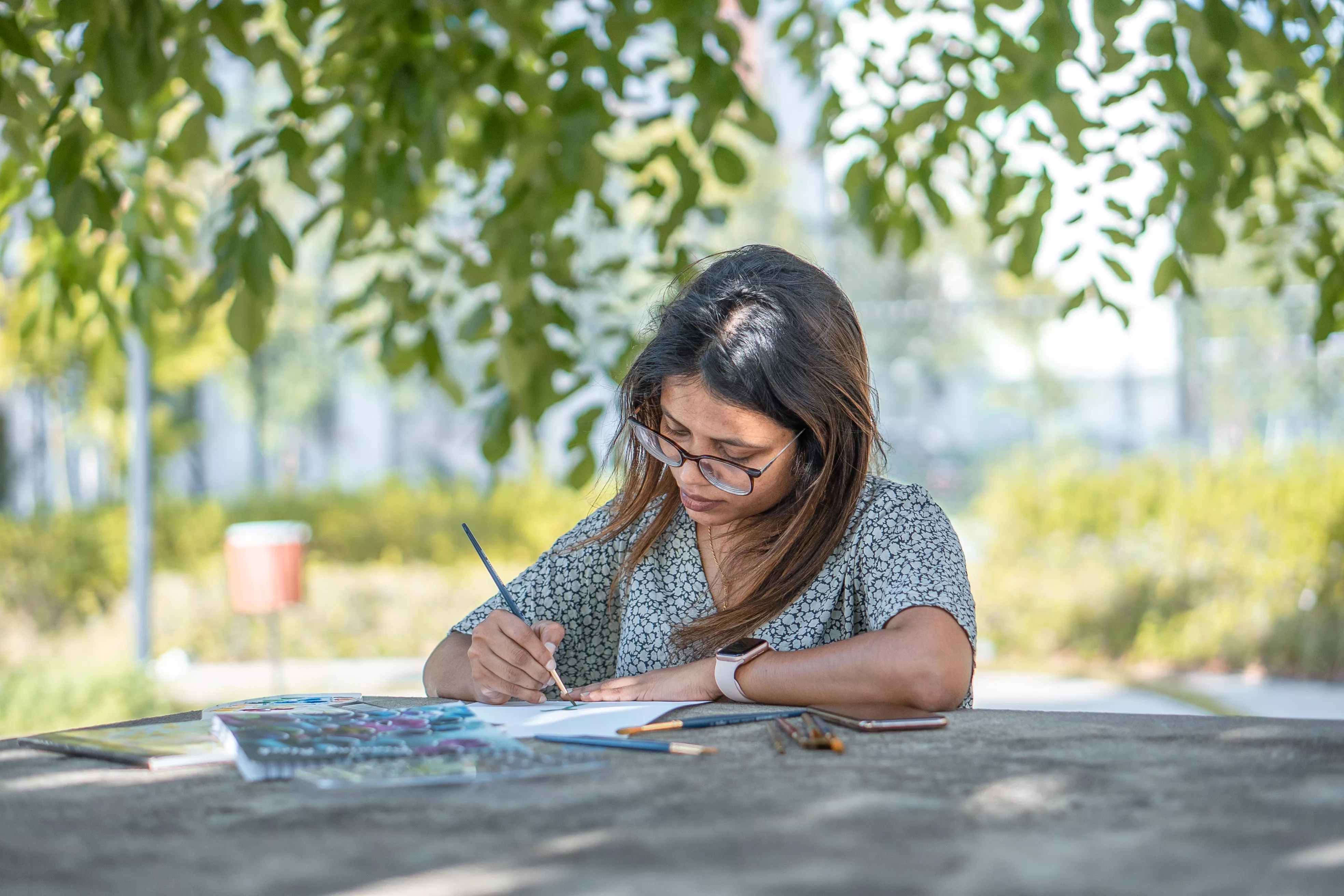Literacy with a heart: what does it mean to put the learner in the centre?

Being unable to read and write well makes it difficult for adults to fully participate in society and economy, but it does not mean that they have no skills or knowledge to speak of. Far from it: resilience, logical or creative thinking can be fostered independently from the so-called “basic skills”. How can we, as adult educators, build on the wealth of learners’ life experience? And what can we do to erase the stigma around low literacy skills, and instead create a learning environment - as well as a political discourse - that doesn’t focus on deficiencies, but on everybody’s contributions and potential?
Adults educators from France, Portugal and Belgium have shared their insights with EAEA’s Aleksandra Kozyra, discussing values, trust, education as a political act, and what it means to teach literacy with a heart.
A few years ago I was taking a flight from Brussels to one of EAEA’s annual conferences, gracefully juggling our roll-up banner and a bag full of event supplies. When I was inevitably stopped at security, the airport staff looked at me with slight disbelief as I unpacked post-its, publications and name plates, which represented a good part of my hand luggage.
“So what is it that you do?”, asked a member of the security staff.
“I work in adult education,” I explained.
“Oh, you mean you teach migrants,” he replied.
“Well, yes, but it’s also more than that,” I tried to clarify, regretting that there was little time for a discussion about non-formal adult education and its scope. The roll-up had just been declared safe to fly, and we had a plane to catch.
If you are working in adult education – and if you are reading this, there is a good chance that you are – you might have heard a similar generalization about our profession on more than one occasion. While foreign language classes will be the first association for many, others will link adult education mainly with career development, or with yoga classes in a nearby community centre. These are all valid assumptions. But many people outside our field would probably be astonished to realize that a large proportion of adult education provision in Europe is dedicated to improving literacy.
Again, if you are an adult education professional, the statistics that will follow are unlikely to surprise you. It is estimated that one in five adults struggles with functional literacy. In practice, this means that one in five European citizens has trouble accessing healthcare, voting in the elections or understanding the lease or the employment contract they have signed.
And yet, while being unable to read and write well will make it difficult for them to fully participate in society and economy, this does not mean that they have no skills or knowledge to speak of. Far from it: resilience, logical or creative thinking can be fostered independently from the so-called “basic skills”. How can we, as adult educators, build on the wealth of learners’ life experience? How can we reconcile the general objectives of the group with the personal goal, talent or interest of each of our learners? And what can we do to erase the stigma around low literacy skills, and instead create a learning environment - as well as a political discourse - that does not focus on deficiencies, but on everybody’s contributions and potential?
Adults educators from France, Portugal and Belgium have shared their insights with me, discussing values, trust, education as a political act, and what it means to teach literacy with a heart.
You have time
“For years, illiteracy in France was misunderstood,” tells me Karin Tudal, who is a director of a local branch of la Ligue de l’enseignement in Bergerac. “It was often mistaken for problems with French as a foreign language. Around ten years ago, a new agency was set up to fight specifically against illiteracy, and to understand why so many adults, after sometimes a decade of formal education in French, still struggle with reading and writing.” Agence Nationale Lutte Contre l’Illettrisme (the National Agency against Illiteracy), where Karin is a Board member, also aims to identify who needs help, and to establish a course of action.
Identification is perhaps one of the most difficult aspects: many adults consider their struggles with reading and writing a source of shame, and keep it a well-hidden secret. “The symbolic power behind literacy, both cultural and historical, is very important in France,” says Karin. This is why one of the key tasks of the agency and its partners was to train professionals working in guidance and orientation services, in order to help them differentiate between problems with French as a foreign language and literacy. This was crucial, as Karin explains, to make sure that adults are oriented towards the right training service.
“Once we meet with them at our adult education centre in Bergerac, we have a long discussion about their previous experiences in education, their personal and professional objectives. We also ask about their availability, and we make the schedule as flexible as possible to make sure they can attend”. A tailor-made course follows, during which each learner has time one-to-one with the educator. Small steps to reaching the goal are recognized through the use of Open Badges. Importantly, the literacy programme allows learners to drop in, out, and then back in, for example if they would like to take a seasonal job in July and pick up where they left off after the summer.
“This might make things complicated for us, but it’s easier for them,” says Karin. “It’s very important to reassure our learners and to be able to tell them: you have time.”

Leaving the door open
“People come to us eager to learn, and they want to learn fast. They feel that they’ve lost time, and that they should catch up,” says Dina Soeiro, who teaches adult education at the School of Education (ESEC) in Coimbra, Portugal and runs Letters for Life, literacy workshops organized in and around the city. “This is a challenge for us.”
Letters for Life is a project-based initiative, and by definition runs differently than literacy courses that Karin has described to me. “We offer a series of 2-hour workshops over the course of around 15 weeks,” explains Dina. The process “starts and ends with the learner,” she says, adding that there is no curriculum; the workshops are planned on the go, together with the participants. At the same time, Letters for Life is a community-based project. This means that every new course is preceded by an analysis of the community, its context and what is significant.
When the Letters for Life team is new to the community, it takes time to build trust and to form connections, but Dina and her colleagues have a way to win everyone over. “We call it ‘literacy with a heart,” laughs Dina. “We joke around, we have fun; we always make sure that we end each workshop on a positive note, for every learner. There are flowers on each table, and coffee. We leave the door open so that anyone can come in.” Sometimes new people do come it, which Dina considers one of the main successes of their approach. “We tend to have more women than men in our workshops. This is because historically, in Portugal women have been more likely to struggle with reading and writing than men.” “At first, the men just wait outside for their wives to finish the workshop. But eventually, they feel encouraged to go through the door,” she says.
From what Dina has told me so far, I get the impression that the participants have very different levels of literacy, and therefore also different goals. She explains that they avoid making it a source of frustration, and one of the objective of the workshop is to ensure that everyone feels they can contribute to the group with their knowledge or life experience.
“In one of our workshops with the Roma community, we ended up having discussions about what it means to be a good mother, and exchanging parenting advice,” she illustrates.
“Every participant will have their own goal, and we help them work towards it,” says Dina, adding that several facilitators are present to offer individual support. “For example, Dona Maria might want to learn to write her name, which means that we’ll have to work on her motor skills. Eventually, she will learn to write the names of her grandchildren, and this will be huge for her. And for another person in the group, the goal will be to write a job application – a very different starting point.”
“One thing is clear: no group is homogenous,” says Dina.

Against the current
Another country, another context; and yet I am not surprised to hear a similar reflection. “There are no homogenous groups,” reaffirms Aurélie Audemar, who is part of the pedagogical staff at Lire et Écrire in the Belgian French community. I have met with Aurélie and her colleague Louise Culot, responsible for research and analysis, to discuss their reference framework, which has a strong focus on learner-centered approaches.
Lire et Écrire is historically a workers’ movement, established in the 1980s. It perceives literacy as a prerequisite to not only claim your rights and to understand the world around you, but also to ultimately transform it.
The framework encourages each educator to start with the learner when planning the course. “I don’t think we added anything new,” says Aurélie, who insists that the enormous work done on the framework was one of co-creation, and that different educators were consulted. “It was more the question of putting together the tools and approaches we’ve been working with, and placing them in the context of our mission as a movement, and the theory and philosophy that underpins it.”
While the framework offers activities that can be helpful when planning a literacy course, such as self-evaluation tools or portfolios, it is not a curriculum. Each course should be built by the educator, based on the needs and goals of the learner, as well as the overall mission of Lire et Ecrire. This is not an easy task; the teaching staff is supported with regular training programmes to better understand the process (“it’s not about asking the learner two or three questions during the first class; it’s a continuum,” says Louise). It can also be emotionally difficult: some learners are in precarious situations, and educators might find that issues like housing will have to be addressed during the course.
“There are many elements that come into play, all of them important: there is the knowledge of each participant and their goals, as well as our mission as a movement. And then there is also the knowledge, experience and specific approach of the educator. Some of them will be more skilled in arts, others will organize outdoor activities,” explains Louise. As a result, each course will very different; the overall objective of empowerment will however stay the same.
“We’re against the current – if you put the learner in the centre, and encourage critical thinking, it will seem risky to those in power,” says Aurélie. “We also try to question the existing norms. Why is there so much insistence on creating a perfect citizen? What about those who can’t keep up with the need for constant upskilling, but who have their own knowledge and competences, which are not valued in our society?”.
As we near the end of our conversation, we finally attempt to find a good translation for “learner-centered” in French. As we deconstruct the expression, we wonder – does it imply focusing solely on the individual?
“I think it’s more than that,” says Aurélie. “I’d say it’s also about helping learners leave their comfort zone, and eventually interact outside the classroom. It’s about being able to open up to others.”
Aleksandra Kozyra is Head of Capacity-Building at the European Association for the Education of Adults (EAEA) in Brussels, Belgium, where she is responsible for EAEA’s events, training programmes and other capacity-building activities. She previously worked as a language teacher in Warsaw, Poland.






Very well said! Thank you for